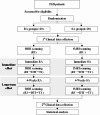The neural plasticity and efficacy of acupuncture for post-stroke dysphagia: protocol for a randomized controlled trial with fMRI and DTI
- PMID: 39367391
- PMCID: PMC11451215
- DOI: 10.1186/s12906-024-04657-1
The neural plasticity and efficacy of acupuncture for post-stroke dysphagia: protocol for a randomized controlled trial with fMRI and DTI
Abstract
Background: Dysphagia, a common complication of acute stroke, is associated with increased mortality and morbidity. Acupuncture, a widely used swallowing therapy in China, has been suggested as an effective therapy for treating Post-Stroke Dysphagia (PSD) by recent meta-analyses and guidelines. The use of resting-state functional Magnetic Resonance Imaging (rs-fMRI) and Diffusion Tensor Imaging (DTI) could explore the change of regional spontaneous neural activity, functional relationships between brain regions, and white matter connectivity patterns after acupuncture intervention for PSD. This trial aims to evaluate the efficacy of acupuncture treatment for PSD and explore its central mechanism by neuroimaging.
Methods/design: This randomized controlled trial will recruit 40 PSD patients. All patients will be randomized to either the Real Acupuncture (RA) or Sham Acupuncture (SA) group by a ratio of 1:1. All patients will receive immediate acupuncture treatment in the MRI scanning room, followed by four weeks of long-term acupuncture treatment. The primary outcomes are the rs-fMRI and DTI indicators, which will be evaluated after the immediate and long-term acupuncture treatment. The secondary outcomes are the scales that assess the efficacy, including the Functional Oral Intake Scale (FOIS), Water Swallowing Test (WST), Swallowing Quality Of Life Questionnaire (SWAL-QOL), and National Institute of Health Stroke Scale (NIHSS). The modified version of the Massachusetts General Hospital Acupuncture Sensation Scale (M-MASS) and fMRI sensation record table will also be evaluated.
Discussion: This protocol presents the design of a randomized, single-blind trial that will evaluate the efficacy and explore the neural plasticity of acupuncture treatment for PSD. This trial will deepen our insight into the clinical value of acupuncture for PSD and initially probe into the time-dosage-effect mechanism of acupuncture.
Trial registration numbers: Chinese Clinical Trial Registry ( www.chictr.org.cn ) ChiCTR2300067480. This study was registered on 9th January 2023.
Keywords: Acupuncture; Diffusion tensor imaging; Dysphagia; Resting-state functional magnetic resonance imaging.
© 2024. The Author(s).
Conflict of interest statement
The authors declare no competing interests.
Figures



References
-
- Martino R, Foley N, Bhogal S, Diamant N, Speechley M, Teasell R. Dysphagia after stroke: incidence, diagnosis, and pulmonary complications. Stroke. 2005;36(12):2756–63. - PubMed
-
- Cohen DL, Roffe C, Beavan J, Blackett B, Fairfield CA, Hamdy S, Havard D, McFarlane M, McLauglin C, Randall M, et al. Post-stroke dysphagia: a review and design considerations for future trials. Int J Stroke: Official J Int Stroke Soc. 2016;11(4):399–411. - PubMed
-
- Wilkinson JM, Codipilly DC, Wilfahrt RP. Dysphagia: evaluation and collaborative management. Am Family Phys. 2021;103(2):97–106. - PubMed
-
- Smithard DG, Smeeton NC, Wolfe CD. Long-term outcome after stroke: does dysphagia matter? Age Ageing. 2007;36(1):90–4. - PubMed
Publication types
MeSH terms
Grants and funding
- 21JCZDJC00890/Tianjin Science and Technology Plan Projects
- 21JCZDJC00890/Tianjin Science and Technology Plan Projects
- 21JCZDJC00890/Tianjin Science and Technology Plan Projects
- 21JCZDJC00890/Tianjin Science and Technology Plan Projects
- 21JCZDJC00890/Tianjin Science and Technology Plan Projects
- 21JCZDJC00890/Tianjin Science and Technology Plan Projects
- 21JCZDJC00890/Tianjin Science and Technology Plan Projects
- 21JCZDJC00890/Tianjin Science and Technology Plan Projects
- 21JCZDJC00890/Tianjin Science and Technology Plan Projects
- 21JCZDJC00890/Tianjin Science and Technology Plan Projects
- No. 2018YFC1705004/National Key R & D Program of China
- No. 2018YFC1705004/National Key R & D Program of China
- No. 2018YFC1705004/National Key R & D Program of China
- No. 2018YFC1705004/National Key R & D Program of China
- No. 2018YFC1705004/National Key R & D Program of China
- No. 2018YFC1705004/National Key R & D Program of China
- No. 2018YFC1705004/National Key R & D Program of China
- No. 2018YFC1705004/National Key R & D Program of China
- No. 2018YFC1705004/National Key R & D Program of China
LinkOut - more resources
Full Text Sources
Medical

